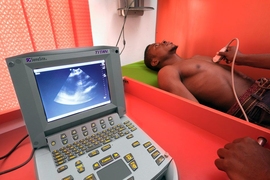Growing up in South Africa at the turn of the century, Emma Gibson saw the rise of the HIV/AIDS epidemic and its devastating impact on her home country, where many people lacked life-saving health care. At the time, Gibson was too young to understand what a sexually transmitted infection was, but she knew that HIV was infecting millions of South Africans and AIDS was taking hundreds of thousands of lives. “As a child, I was terrified by this monster that was HIV and felt so powerless to do anything about it,” she says.
Now, as an adult, her childhood fear of the HIV epidemic has evolved into a desire to fight it. Gibson seeks to improve health care for HIV and other diseases in regions with limited resources, including South Africa. She wants to help health care facilities in these areas to use their resources more effectively so that patients can more easily obtain care.
To help reach her goal, Gibson sought mathematics and logistics training through higher education in South Africa. She first earned her bachelor’s degree in mathematical sciences at the University of the Witwatersrand, and then her master’s degree in operations research at Stellenbosch University. There, she learned to tackle complex decision-making problems using math, statistics, and computer simulations.
During her master’s, Gibson studied the operational challenges faced in rural South African health care facilities by working with staff at Zithulele Hospital in the Eastern Cape, one of the country’s poorest provinces. Her research focused on ways to reduce hours-long wait times for patients seeking same-day care. In the end, she developed a software tool to model patient congestion throughout the day and optimize staff schedules accordingly, enabling the hospital to care for its patients more efficiently.
After completing her master’s, Gibson wanted to further her education outside of South Africa and left to pursue a PhD in operations research at MIT. Upon arrival, she branched out in her research and worked on a project to improve breast cancer treatment in U.S. health care, a very different environment from what she was used to.
Two years later, Gibson had the opportunity to return to researching health care in resource-limited settings and began working with Jónas Jónasson, an associate professor at the MIT Sloan School of Management, on a new project to improve diagnostic services in sub-Saharan Africa. For the past four years, she has been working diligently on this project in collaboration with researchers at the Indian School of Business and Northwestern University. “My love language is time,” she says. “If I’m investing a lot of time in something, I really value it.”
Scheduling sample transport
Diagnostic testing is an essential tool that allows medical professionals to identify new diagnoses in patients and monitor patients’ conditions as they undergo treatment. For example, people living with HIV require regular blood tests to ensure that their prescribed treatments are working effectively and provide an early warning of potential treatment failures.
For Gibson’s current project, she’s trying to improve diagnostic services in Malawi, a landlocked country in southeast Africa. “We have the tools” to diagnose and treat diseases like HIV, she says. “But in resource-limited settings, we often lack the money, the staff, and the infrastructure to reach every patient that needs them.”
When diagnostic testing is needed, clinicians collect samples from patients and send the samples to be tested at a laboratory, which then returns the results to the facility where the patient is treated. To move these items between facilities and laboratories, Malawi has developed a national sample transportation network. The transportation system plays an important role in linking remote, rural facilities to laboratory services and ensuring that patients in these areas can access diagnostic testing through community clinics. Samples collected at these clinics are first transported to nearby district hubs, and then forwarded to laboratories located in urban areas. Since most facilities do not have computers or communications infrastructure, laboratories print copies of test results and send them back to facilities through the same transportation process.
The sample transportation cycle is onerous, but it’s a practical solution to a difficult problem. “During the Covid pandemic, we saw how hard it was to scale up diagnostic infrastructure,” Gibson says. Diagnostic services in sub-Saharan Africa face “similar challenges, but in a much poorer setting.”
In Malawi, sample transportation is managed by a nongovernment organization called Riders 4 Health. The organization has around 80 couriers on motorcycles who transport samples and test results between facilities. “When we started working with [Riders], the couriers operated on fixed weekly schedules, visiting each site once or twice a week,” Gibson says. But that led to “a lot of unnecessary trips and delays.”
To make sample transportation more efficient, Gibson developed a dynamic scheduling system that adapts to the current demand for diagnostic testing. The system consists of two main parts: an information sharing platform that aggregates sample transportation data, and an algorithm that uses the data to generate optimized routes and schedules for sample transport couriers.
In 2019, Gibson ran a four-month-long pilot test for this system in three out of the 27 districts in Malawi. During the pilot study, six couriers transported over 20,000 samples and results across 51 health care facilities, and 150 health care workers participated in data sharing.
The pilot was a success. Gibson’s dynamic scheduling system eliminated about half the unnecessary trips and reduced transportation delays by 25 percent — a delay that used to be four days was reduced to three. Now, Riders 4 Health is developing their own version of Gibson’s system to operate nationally in Malawi. Throughout this project, “we focused on making sure this was something that could grow with the organization,” she says. “It’s gratifying to see that actually happening.”
Leveraging patient data
Gibson is completing her MIT degree this September but will continue working to improve health care in Africa. After graduation, she will join the technology and analytics health care practice of an established company in South Africa. Her initial focus will be on public health care institutions, including Chris Hani Baragwanath Academic Hospital in Johannesburg, the third-largest hospital in the world.
In this role, Gibson will work to fill in gaps in African patient data for medical operational research and develop ways to use this data more effectively to improve health care in resource-limited areas. For example, better data systems can help to monitor the prevalence and impact of different diseases, guiding where health care workers and researchers put their efforts to help the most people. “You can’t make good decisions if you don’t have all the information,” Gibson says.
To best leverage patient data for improving health care, Gibson plans to reevaluate how data systems are structured and used in the hospital. For ideas on upgrading the current system, she’ll look to existing data systems in other countries to see what works and what doesn’t, while also drawing upon her past research experience in U.S. health care. Ultimately, she’ll tailor the new hospital data system to South African needs to accurately inform future directions in health care.
Gibson’s new job — her “dream job” — will be based in the United Kingdom, but she anticipates spending a significant amount of time in Johannesburg. “I have so many opportunities in the wider world, but the ones that appeal to me are always back in the place I came from,” she says.













